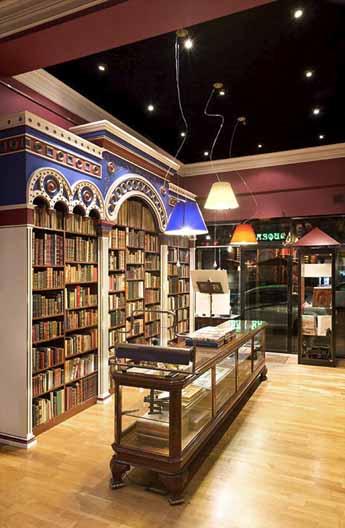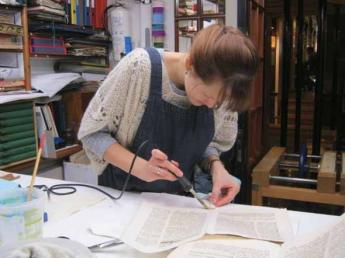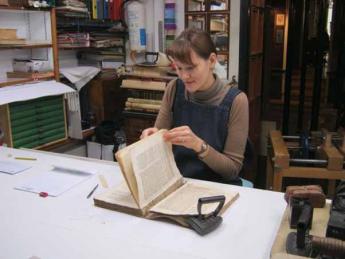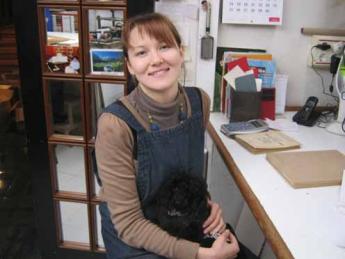Guild of Antiquarian Booksellers
ILAB Internships Out of the Classroom, into the World: Bilbao, Spain 2013
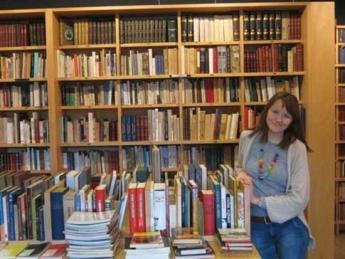
By Ksenia Batueva
Hola to everybody from Spain! So, the first part of my internship – two weeks, which I spent in Bilbao – is, I regret to say, over and I’m going to let you know how amazing it was.
One of the late rainy evenings I arrived in Bilbao, a big city on the north of Spain, capital of the Province Vizcaya, where bookseller Javier Madariaga met me at the station and kindly invited to stay in his gorgeous house for almost two weeks. Javier owns two bookshops in Bilbao: the first one – Astarloa with a great 21-years history – sells mainly antiquarian books about the Basque Country and the Province Vizcaya and also has a workshop for restoration and bookbinding; the second one – Libreria de Bilbao, where Javier’s elder son Iker works – is situated near the Guggenheim Museum and specialized on modern and second-hand books and also on engravings, postcards, and pictures.
My first days in Bilbao were devoted to learning some usual processes of the antiquarian bookshop life: description of new items, handling of Internet orders, receiving unsold books from the auction house etc. Evidently, the description (and valuation) of books is the most common and routine part of the work, but it doesn’t make the process boring. While you are describing the book, you have an opportunity to get a lot of new information and to enjoy the pleasure of seeing beautiful engravings, pictures, masterpieces of bookbinding art. Also you can improve your skills in taking photos. Of course, not every book has remarkable characteristics to mention, but the routine is also a part of the work. All the descriptions at Astarloa are written in Spanish, so I didn’t have a chance to make one by myself (because my Spanish is not so good yet), but for me even observing the process was a great experience. Handling with orders on the main Internet pages (IberLibro – part of Abebooks, Amazon, Uniliber) is also an important part of the everyday work – it has its scheme and certain rules of dealing with clients, shipping and commission, set by sites’ administration.
During this time I had very interesting conversations (or better to say “lectures” – because all the time I had been in a role of a listener) about the history of Basque Country, about the fighting of Basque people for their independence and rights and how all that now influences on bibliophily and the assortment of old books in Bilbao and other cities of the Basque Country. Suffice is to say that among Javier Madariaga’s permanent clients there are some famous bibliophiles, who have enormous private libraries, connected especially with the Basque culture and built with the great help of Javier.
Talking about the Basque subject in the space of Astarloa, it’s impossible not to mention the collection of bibliophilic editions, written and printed almost entirely by Javier Madariaga. There are nine at the moment; all of them are printed on the finest paper and have excellent design and illustrations. All the books are dedicated to different themes, connected with the Basque Country; the quantity of numerated exemplars is 500 for each edition. In December the next book will appear – “Don Quixote en Vizcaya” – it is a new story about the adventures of the famous Cervantes’ character.
One of the noticeable moments in Astarloa for me was the work with very important Spanish bibliographies, such as A. Palau y Dulcet’s “Manual del librero hispano-americano”, A. Nicolas’ “Bibliotheca Hispana nova” and “Bibliotheca Hispana vetus” (the first bibliography in Spain, printed in 1783-1788), Genaro de Sorarrain’s “Catalogo de obras euskaras” (the first bibliography in the Basque Country, printed in 1898), P. Salva y Mallen’s “Catalogo de la Bibliotheca de Salva” etc. Moreover, I found on the shelves facsimiles of some of the first books printed on the Spanish territory in th 15th century: “El Sinodal de Aguilafuente”, “Les trobes en lahors de le Verge Maria”.
But most of my time I spent in the workshop of restoration and bookbinding – and to be honest, it was a really awesome experience for me, because at my university we don’t have special courses on such disciplines. There, in the workshop, I observed the work of the masters (maybe the best in Spain!) and learnt to do easy things. Now I have some occasions to be proud of myself – I’ve made two books: one with a simple soft Japanese binding and the other with a hard half-leather binding with pressing on it “Mi primer libro” (“My first book”).
Restoration is a long, insistent, even intricate process – it was difficult, but very interesting for me. Now I suppose that restoration is one of the best ways to learn how to keep yourself concentrated – that is funny, because the motto of the restorer in Astarloa is “Ante todo mucha calma” (“First of all stay calm”). I learnt some basic things in restoration: preparing and cleaning up pages, washing pages with special water, repairing paper with special equipment, stitching old sheets. Unfortunately, I did not have enough time to finish the whole cycle (re-binding etc.), but I received a lot of useful knowledge. Of course, the things would not have been possible without the great help and incredible support of my teachers!
Among the days spent in Astarloa, I had an opportunity to visit the other bookstore – Libreria de Bilbao. It appeals to younger people (because of its managing director) and has a different assortment: a lot of books about art, literature, engravings by famous Spanish artists such as Chillida, Ibarrola etc.
It’s impossible to be in Spain and not to enjoy all the pleasures it offers, and I’m happy to share my delights with you! So, in a few words my activities comprised: pintxos (it means tapas in Basque language) in the best bars of Bilbao, the 55th international festival of short films Zinebi, the Guggenheim Museum (inside was the temporary exhibition of Antonio Tapies, and outside… I won’t tell you – you should just see how gorgeous it is), Sunday’s flea markets (with a lot of books, by the way), picturesque landscapes with mountains (but, unfortunately, only through the car window, because of the rainy weather). And also I would like to share with you my little personal joy – my Spanish is getting better! This is very important, because now I am in Barcelona, starting to work with Albert Casals, who doesn’t speak English. I will do my best!
P.S. Astarloa impressed me much before I had even seen it. When I was writing my diploma paper half a year ago about the antiquarian book trade in Spain, I saw some pictures in the Internet. But in reality this place is even more beautiful – a true kingdom of old books, the best antiquarian bookstore in Bilbao! Astarloa has a soul, and I am happy that I had an opportunity to touch this magic. And last, but not least, I say many many thanks from the bottom of my heart to Javier Madariaga, Iker Madariaga, Mintxi Borobia, Nekane Lecue, Jon Lecue, Igone Lecue, Begona, Ani, Laura.
Hope you liked my notes from Spain and also hope you will forgive me my mistakes.
To be continued …
